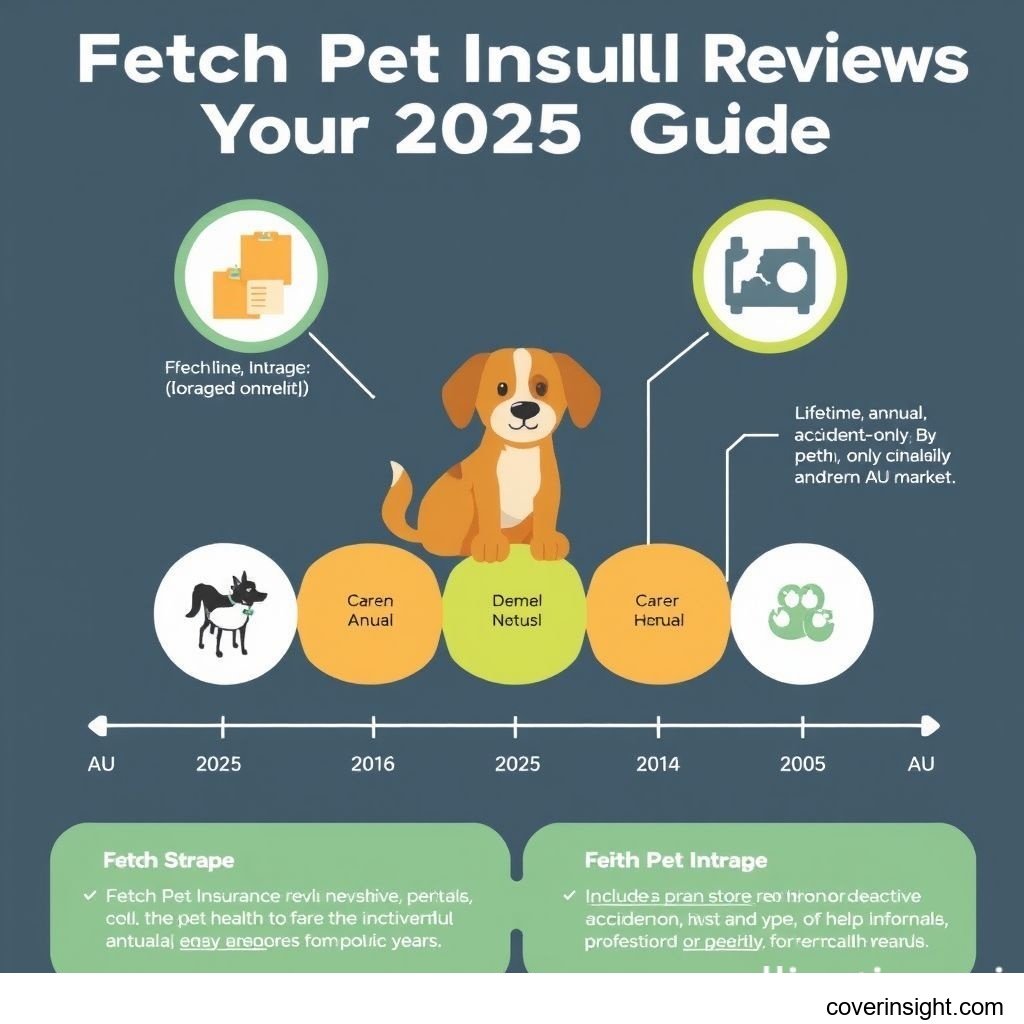Introduction
As 2025 unfolds, Australian pet owners are increasingly turning their attention towards robust financial protection for their beloved companions. Understanding fetch pet insurance reviews is crucial in this landscape, offering insights into one of the key providers in the market. Pet insurance is no longer a luxury but a vital component of responsible pet ownership, helping to mitigate the often-unpredictable and significant costs of veterinary care. This comprehensive guide aims to arm you with all the necessary information to navigate the complexities of pet insurance, specifically focusing on what fetch pet insurance reviews consistently highlight. We'll delve deep into coverage specifics, cost implications, and real-world customer experiences, empowering you to make an informed decision for your furry family member in 2025.
Fetch Pet Insurance Reviews: Coverage Options and Plans
When evaluating any pet insurance provider, the scope of coverage is paramount. Fetch Pet Insurance in Australia offers various plans designed to cater to different needs and budgets. Understanding what’s included and, equally important, what’s typically excluded, is key to managing expectations and ensuring your pet is adequately protected.
What’s Included
Fetch Pet Insurance generally covers a broad spectrum of veterinary treatments for unexpected illness and accidental injuries. Policies are designed to provide financial relief during stressful times. Common inclusions often highlighted in fetch pet insurance reviews include:
-
Accidental Injury: Coverage for vet consultations, hospitalisation, surgery, and diagnostics resulting from accidents (e.g., car accidents, falls).
-
Illness: Comprehensive cover for a wide range of illnesses, from common infections to more serious conditions like cancer or diabetes. This includes consultations, pathology tests, imaging (X-rays, ultrasounds, MRI/CT scans), medications, and specialist referrals.
-
Emergency Care: Costs associated with urgent veterinary attention in critical situations.
-
Hospitalisation: Expenses for overnight stays at the vet, including nursing care and monitoring.
-
Prescription Medications: Drugs prescribed by a vet for covered conditions.
-
Alternative Therapies: Depending on the policy, some complementary treatments like physiotherapy, hydrotherapy, chiropractic care, and acupuncture may be covered if recommended by a vet.
-
Cruciate Ligament Conditions: Often a significant expense, these are typically covered after an initial waiting period.
-
Paralysis Tick Treatment: A common and often life-threatening issue in Australia, related treatment costs are usually included.
Common Exclusions
While comprehensive, no pet insurance policy covers everything. It’s vital to be aware of common exclusions to avoid surprises. Many fetch pet insurance reviews touch upon these points, emphasising the importance of reading the Product Disclosure Statement (PDS).
Typical exclusions often include:
-
Pre-existing Conditions: Any illness or injury that showed clinical signs before the policy started or during the waiting period. This is a standard exclusion across almost all pet insurance providers.
-
Routine/Preventative Care: Vaccinations, flea/tick/worming treatments, routine check-ups, and elective procedures (e.g., desexing) are generally not covered under standard illness and accident plans. Some providers offer optional "wellness" add-ons for these.
-
Elective Procedures: Cosmetic surgeries or procedures not deemed medically necessary.
-
Behavioral Conditions: Unless specified, behavioural issues and related treatments may not be covered.
-
Pregnancy and Breeding: Costs associated with breeding, whelping, or pregnancy complications.
-
Dietary and Nutritional Supplements: Unless prescribed for a covered condition, these are usually excluded.
-
Specific Conditions (Waiting Periods): Certain conditions, like cruciate ligament issues, often have longer waiting periods (e.g., 6 months) than general illnesses or accidents.
Accident-Only vs Comprehensive: A Fetch Pet Insurance Review Perspective
Choosing between an accident-only policy and a comprehensive plan is one of the most critical decisions pet owners face. The fetch pet insurance reviews often highlight how these two options cater to different financial risk tolerances and pet health needs. Understanding the nuances between them is crucial for effective coverage.
Choosing the Right Plan
The choice between an accident-only and a comprehensive plan depends on your budget, your pet's age, breed, and your personal risk assessment.
-
Accident-Only Plans: These policies are generally the most affordable option, providing coverage specifically for unexpected injuries resulting from accidents. This can include broken bones, cuts, burns, snake bites, poisoning, or car accident injuries. They typically do not cover illnesses like ear infections, arthritis, cancer, or allergies. While budget-friendly, many fetch pet insurance reviews from long-term customers suggest that the lack of illness coverage can be a significant limitation, especially as pets age and become more susceptible to chronic conditions. These plans are best suited for owners who want basic protection against sudden, high-cost emergencies but are prepared to cover illness-related vet bills out-of-pocket.
-
Pros: Lower premiums, covers significant emergency costs.
-
Cons: No coverage for illnesses, chronic conditions, or routine care.
-
-
Comprehensive Plans: These plans offer a much broader scope of protection, covering both accidental injuries and a wide range of illnesses. This includes everything from minor infections to major surgeries, hospitalisation, and ongoing treatment for chronic conditions. While comprehensive policies have higher premiums, they offer greater peace of mind and can save thousands of dollars over a pet’s lifetime, particularly for unexpected illnesses that can quickly accumulate significant vet bills. Many positive fetch pet insurance reviews often come from owners who have benefited from the extensive coverage of a comprehensive plan during a pet’s serious illness.
-
Pros: Extensive coverage for accidents and illnesses, covers major and minor health issues.
-
Cons: Higher premiums.
-
When assessing fetch pet insurance reviews for plan types, consider your pet’s lifestyle. An adventurous dog might benefit more from robust accident coverage, while a purebred predisposed to certain genetic conditions might necessitate a comprehensive illness plan.
Dental Care Coverage: What Fetch Pet Insurance Reviews Reveal
Dental health is a significant, yet often overlooked, aspect of a pet’s overall well-being. The inclusion, or exclusion, of dental care coverage can heavily influence the value proposition of a pet insurance policy. Fetch pet insurance reviews frequently discuss the importance of this specific coverage and what it entails.
Importance of Oral Health
Poor dental hygiene in pets can lead to a multitude of health problems beyond just bad breath. These can include:
-
Periodontal Disease: Infection and inflammation of the structures surrounding the teeth, potentially leading to tooth loss.
-
Systemic Issues: Bacteria from dental disease can enter the bloodstream, affecting vital organs like the heart, kidneys, and liver.
-
Pain and Discomfort: Severe dental issues can cause chronic pain, impacting a pet's eating habits and quality of life.
Standard pet insurance policies typically do not cover routine dental cleanings (scaling and polishing). However, some comprehensive plans or optional add-ons may include dental care coverage for specific procedures. What fetch pet insurance reviews usually reveal is that Fetch, like many insurers, generally covers the cost of non-routine dental procedures necessitated by accident or illness, such as:
-
Extraction of diseased teeth: If a tooth needs to be removed due to an injury (e.g., broken tooth from an accident) or a covered illness (e.g., severe infection).
-
Treatment of dental fractures: If a tooth is broken due to an accidental injury.
-
Gingivitis or Periodontitis treatment: When these conditions are a direct result of a covered illness and require extensive medical intervention, beyond routine cleaning.
It is crucial to verify the specifics regarding dental care coverage within the Product Disclosure Statement (PDS) of any Fetch Pet Insurance policy. Some policies might offer optional wellness packages that include a contribution towards routine dental cleaning, which is a separate offering from core accident/illness coverage. Owners seeking extensive dental care coverage should explicitly look for this in policy details or inquire directly with Fetch.
Cost Analysis
Understanding the factors that influence the cost of fetch pet insurance reviews is essential for budgeting and finding a policy that offers both adequate protection and affordability. Premiums can vary significantly based on several key determinants.
Price Factors
The cost of your Fetch Pet Insurance premium is not arbitrary; it's calculated based on a risk assessment. Here are the primary factors that influence how much you'll pay:
-
Pet's Age: Generally, younger pets are cheaper to insure because they are less prone to age-related illnesses. As your pet gets older, the risk of health issues increases, and so do premiums. Many fetch pet insurance reviews from long-term customers note the gradual increase in premiums over their pet's lifespan.
-
Pet's Breed: Some breeds are predisposed to specific genetic conditions or health problems, making them more expensive to insure. For example, large breeds might be more susceptible to joint issues, while certain purebreds could have higher risks for particular diseases.
-
Pet's Species: Cats generally have lower premiums than dogs, as they typically have fewer vet visits and less complex medical needs.
-
Chosen Plan Type: As discussed, comprehensive plans are more expensive than accident-only policies due to their broader coverage.
-
Reimbursement Rate: This is the percentage of eligible vet bills that the insurer will pay back (e.g., 70%, 80%, or 90%). A higher reimbursement rate means a higher premium.
-
Annual Benefit Limit: This is the maximum amount the insurer will pay out in a policy year. Policies with higher annual limits typically have higher premiums.
-
Excess Amount: This is the fixed amount you pay towards a claim before the insurer pays out. A higher excess usually results in a lower premium, and vice-versa.
-
Location: Veterinary costs can vary by region, influencing premiums. Vet fees in major metropolitan areas might be higher, leading to slightly increased insurance costs.
Saving Tips
While some factors are beyond your control, there are ways to potentially reduce your Fetch Pet Insurance premiums without compromising essential coverage:
-
Choose a Higher Excess: Opting for a higher excess amount (e.g., $200 instead of $0 or $100) will generally lower your monthly or annual premium. This is suitable if you have an emergency fund for smaller claims.
-
Select a Lower Reimbursement Rate: If you choose an 80% reimbursement instead of 90%, your premium will be lower. Be prepared to cover a larger portion of the vet bill yourself.
-
Opt for a Lower Annual Benefit Limit: While not recommended for comprehensive protection, choosing a slightly lower annual payout limit can reduce premiums. This carries more risk if your pet faces a significant, ongoing health issue.
-
Pay Annually: Many insurers, including Fetch, offer a discount if you pay your premium annually rather than monthly.
-
Multi-Pet Discount: If you have multiple pets, enquire about multi-pet discounts. Fetch and other insurers often provide a small reduction for insuring more than one animal.
-
Maintain Your Pet's Health: While not directly affecting premiums, proactive preventative care (diet, exercise, regular check-ups) can keep your pet healthier, reducing the likelihood of claims and potentially leading to less frequent premium increases due to claim history.
-
Review Annually: Don't just auto-renew. Take the time each year to compare your current policy with new offerings from Fetch and other providers. Your pet's needs might have changed, or new, more suitable products might be available. This proactive comparison is often highlighted in practical fetch pet insurance reviews.
Customer Experience and Claims: Fetch Pet Insurance Reviews
The true test of any insurance provider lies in its customer service and, critically, its claims process. When sifting through fetch pet insurance reviews, these aspects are often front and centre, reflecting real-world interactions and satisfaction levels.
Making a Claim
The efficiency and clarity of the claims process are vital. A streamlined process can significantly alleviate stress during an already difficult time. Typically, the Fetch Pet Insurance claims process involves:
-
Vet Visit & Payment: Your pet receives treatment at a licensed veterinary clinic. You pay the vet bill in full at the time of service.
-
Gathering Documentation: Collect your detailed veterinary invoice(s) and any relevant medical notes from the vet.
-
Submitting the Claim: Claims can usually be submitted online via the Fetch customer portal or app. You'll need to upload the required documents. Ensure all details are accurate to avoid delays.
-
Assessment: Fetch reviews your claim, checking eligibility against your policy terms, waiting periods, and exclusions.
-
Reimbursement: If approved, the eligible reimbursement amount (less your excess) is paid directly into your nominated bank account.
Tips for a Smooth Claim:
-
Understand Your Policy: Be familiar with your waiting periods, annual limits, and any specific exclusions.
-
Keep Records: Maintain organised records of all vet visits, invoices, and medical reports.
-
Prompt Submission: Submit claims as soon as possible after treatment.
-
Follow Instructions: Ensure all required fields in the claim form are completed accurately.
Some fetch pet insurance reviews commend the ease of online claim submission, while others occasionally mention longer processing times during peak periods.
Support and Service
Customer support quality encompasses everything from initial enquiries to post-claim follow-ups.
-
Accessibility: Fetch typically offers customer support via phone, email, and sometimes live chat. Check their operating hours.
-
Knowledge & Helpfulness: Are the representatives knowledgeable about policy specifics and helpful in resolving queries? Positive fetch pet insurance reviews often highlight responsive and empathetic staff.
-
Communication: How well does Fetch communicate updates on claims or policy changes? Clear and timely communication is key.
-
Online Resources: Does Fetch provide comprehensive FAQs, policy documents, and a user-friendly online portal for managing your policy?
Overall, customer experience can be subjective, but consistent feedback in fetch pet insurance reviews will provide a general indication of the company's service quality. A quick check on independent review platforms can offer further insights.
FAQs About Fetch Pet Insurance Reviews
Here are some frequently asked questions about fetch pet insurance reviews and pet insurance in general, designed to help clarify common concerns for Australian pet owners.
How much does fetch pet insurance reviews cost?
The cost of Fetch Pet Insurance varies significantly. As highlighted in many fetch pet insurance reviews, premiums depend on factors like your pet's age, breed, species, the type of plan you choose (accident-only vs. comprehensive), your selected reimbursement rate, annual benefit limit, and excess amount. For an accurate quote, it's best to use Fetch's online quote tool, which will provide a personalised estimate based on your specific pet and desired coverage.
What affects premiums?
Several key factors affect pet insurance premiums. These include:
-
Pet's age: Older pets typically have higher premiums.
-
Breed: Some breeds are predisposed to health issues, increasing costs.
-
Species: Dogs generally cost more to insure than cats.
-
Policy type: Comprehensive plans are more expensive than accident-only.
-
Chosen limits and excesses: Higher reimbursement rates and annual limits, and lower excesses, lead to higher premiums.
-
Location: Veterinary costs can vary by region.
Is pet insurance mandatory in Australia?
No, pet insurance is not mandatory in Australia. It is an optional financial product designed to help pet owners manage unexpected veterinary expenses. However, many pet owners choose to purchase it due to the rising costs of advanced veterinary care. For more information on Australian financial regulations, you can visit the Australian Prudential Regulation Authority.
How to choose the best pet insurance?
Choosing the best pet insurance, informed by fetch pet insurance reviews and other providers, involves:
-
Assessing your pet's needs: Consider age, breed, and health history.
-
Budgeting: Determine what you can afford for premiums and excess.
-
Comparing policies: Look at coverage limits, reimbursement rates, and exclusions across different providers.
-
Reading the PDS: Always read the Product Disclosure Statement thoroughly to understand what is and isn't covered.
-
Checking waiting periods: Be aware of how long you need to wait before certain conditions are covered.
-
Considering customer service and claims reputation: Research company reviews and claims processing efficiency.
-
For broader industry insights, consult resources like the Insurance Council of Australia.
What are the consequences of having no pet insurance coverage?
Without pet insurance, you are solely responsible for the full cost of all veterinary treatments. This can lead to significant financial strain, especially for:
-
Unexpected Accidents: High costs for emergency surgery, diagnostics, or extended hospital stays.
-
Sudden Illnesses: Diagnosis and treatment for serious conditions like cancer or organ failure can run into thousands of dollars.
-
Chronic Conditions: Long-term management of conditions like diabetes or arthritis can incur ongoing medication and consultation fees.
Without insurance, pet owners might face difficult decisions, potentially having to choose between costly life-saving treatments and their financial well-being. For more general insurance resources, you can explore Insurance Resources Global. Understanding the financial risks involved is a key takeaway from many fetch pet insurance reviews. For Australian-specific insurance information, visit AU Insurance Home.










Comments